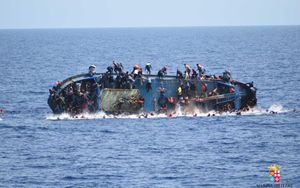(Finance) – After ten years of trying, in Brussels it’s time to white smoke: The Council, Commission and Parliament have in fact found “political agreement” on the five legislative pieces that make up the heart of the new Pact on migration and asylum.
Among the effects, the retirement of the Dublin agreement and the arrival of “mandatory solidarity” towards the countries of first arrival, such as Italy. And if the blue-starred leaders speak of a “Historic Day”, there is no shortage of criticism. The government of Hungarian Viktor Orban, in fact, “strongly rejects” the agreement and assures you that he will not let you in “no migrants” against his will.
Promise easy to keep because the new Pact does not provide for forced relocations but financial contributions (20 thousand euros per person) or “other forms” for those who do not agree to help other countries by physically hosting migrants. Poland and Hungary had already been isolated last June when the Council used majority voting (no veto in this matter) to overcome years of impasse between the states. The agreement between the “trilogue” is the result of that passage, already in its own historical way.
However, NGOs were also dissatisfied. For Amnesty International, the reform will “set European asylum legislation back by decades” and lead to “greater human suffering”. The Pact, insists Amnesty, “does not concretely support countries like Italy, Spain or Greece, and instead of giving priority to solidarity through relocations, states will simply be able to pay to strengthen external borders or finance countries outside the EU”.
Instead, Italy’s applause arrives. “Thanks to the ability to find the right balance between responsibility and solidarity we have managed to carry forward ecto conclude a negotiation that had been at a standstill for years”, commented the minister of the Interior Matteo Piantedosi.
“The approval of the Pact is a great success for Europe and for Italy, which will now be able to count on new rules to manage migratory flows and combat human traffickers”. Negotiations will now continue to translate the political agreement into legal texts, with new details set to emerge more clearly in the future. But appreciation also comes from other countries on the southern shore, Spain and Greece in the lead. Naturally, then, there is also a more purely political aspect. “It is not perfection, it is still a compromise, but the pro-European camp can show that it is concrete”, underlines the President of the European Chamber Roberta Metsola
